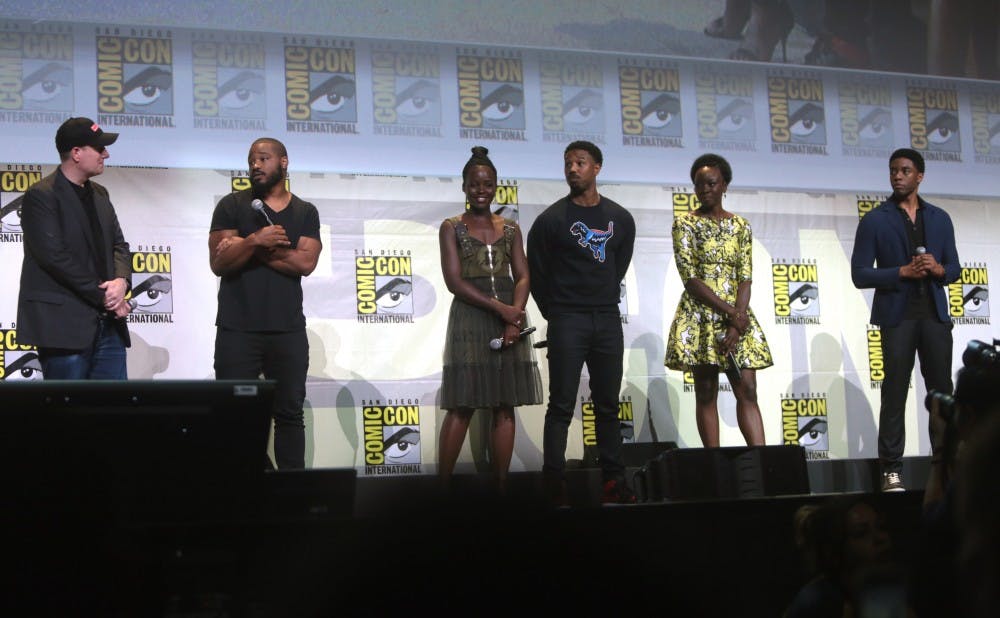“Black Panther” has finally hit theaters, but this time around, our eponymous superhero isn’t just here to take names. When the death of his father forces T’Challa to assume the mantle of king, the Black Panther must learn that — to repurpose a classic superhero-ism — with great power comes great responsibility. Yet unlike the superhero fluff we’ve come to expect, “Black Panther” has ascended to a level of cultural phenomenon unmatched by its predecessors.
As a longtime fan of the Marvel Cinematic Universe, I entered my screening last Thursday night simply excited to see another comic book flick. But for the swell of black audience members present at the theater, many of whom arrived proudly dressed in traditional African attire and black fraternity letters, I understood the significance of a mainstream American movie which both celebrates African culture and provides representation for a group of people who don’t often get to claim superheroes as their own. Eighteen movies deep into the MCU, I have always taken for granted that the franchise’s protagonists look like me. The Ryan Coogler-helmed “Black Panther,” which features a predominantly black cast and a vibrant soundtrack produced by Kendrick Lamar, breaks this trend and shatters many of the barriers which we so often forget still exist within big-budget Hollywood.
Considering the widespread reach of MCU movies, I further applaud the filmmakers for not shying away from complicated racial issues. Never before did I expect a movie that tackles difficult questions like reparations for slavery and colonialism to score the fifth-largest opening weekend ever. But coupled with the financial success of last year’s female-driven “Wonder Woman,” I expect studios to rethink the way they treat diversity and political messages in their upcoming projects.
Cultural significance aside, “Black Panther” is certainly a great time at the movies and should satisfy any audience. The film features likable characters, including the stoic T’Challa, jubilant gadgets expert Shuri, superspy Nakia and warrior badass Okoye. Coogler also invests justified time into building the world of Wakanda, exploring its tribal politics and showing off its vibranium-powered technology, to the point where the nation itself serves as a full-fleshed character. I suspect I wasn’t the only person leaving the movie wishing I could visit the country one day.
Nevertheless, I still exited the theater disappointed that “Black Panther” failed to further distance its Shakespearean grandeur from its distinctly Marvellian tropes. When “Thor: Ragnarok” was released in November, I complained that Marvel constrained Taika Waititi’s vision of a stupidly fun superhero romp by shoehorning in an all-too-serious doomsday plot. In reverse fashion, “Black Panther” shines brightest as a political drama while losing strides every time it surrenders to its generic Marvel-isms.
“Black Panther” carries a lot more thematic weight and relevant social commentary than your granddaddy’s superhero movie. Historically, Wakanda has flourished under the guise of being a poor rural nation in order to protect its vibranium reserves from colonial invaders. As the film progresses, however, seeds of unrest planted under the previous king cause many Wakandans to to denounce the King’s isolationist policy for ignoring the hardship of its neighbors.
Enter Killmonger, Michael B. Jordan’s charismatic Wakandan exile-turned-American assassin who arrives on T’Challa’s doorstep to seize the throne. Perhaps the best conceived villain to threaten the MCU to date, Killmonger’s crusade against the world stems from his experience as a black man marginalized in American society and cast out by his homeland. As a villain whose murderous ways emerge as a byproduct of the world’s afflictions, Killmonger’s heartbreaking descent into evil should resonate with audiences in a much more powerful way than any of Marvel’s previous antagonists.
In execution, however, the movie hardly grants Jordan the screen time he deserves to reach a Heath Ledger’s Joker-level of villainy. Mostly absent from the first half of the movie, Killmonger descends upon Wakanda for a reign of terror which feels like mere minutes before being shoved into a bland final action sequence. Upon re-watch, I imagine I’ll resent the entertaining, albeit expendable, casino brawl with Andy Serkis’ Klaue for stripping precious scenes away from Jordan.
In fact, I felt similarly about most of the “superhero” moments throughout the film. There is nothing wrong, per se, with the action, but none of it is memorable enough to truly differentiate the noise from that of its superhero brethren. And for once, “Black Panther” gives us enough interesting drama that I could have done without action entirely. I wish the movie lingered more on heady conversations and character moments, many of which felt cut short as the plot raced towards another loud set piece. Rarely do I wish a two-hour-plus movie was 30 minutes longer, but granting Coogler’s intricate ideas extra time to marinate would have enabled “Black Panther” to reach unparalleled heights for a comic book film.
“Black Panther” is so much more than just a superhero movie. But as superhero fatigue sets in, I wish it chose not to be another superhero movie at all. While I’m aware blockbusters need punches and explosions to fill seats, I would’ve delightfully gobbled my popcorn watching T’Challa and Killmonger grapple with their words instead of their claws. Regardless, I cannot commend Coogler enough for crafting an intelligent, topical and innovative piece in a space dominated by the trivial. The world of “Black Panther” is so compelling, filled with incredible characters who have so much to say, and I’m anxiously awaiting my return to Wakanda.
Get The Chronicle straight to your inbox
Signup for our weekly newsletter. Cancel at any time.

